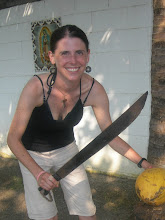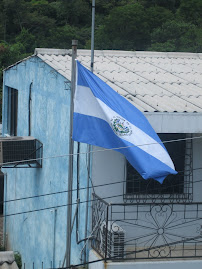
So after several months of searching on foot and within my heart, I have finally discovered where I am meant to be. It is a small, country town in the Western end of El Salvador called Santo Domingo de Guzman. I have visited there a few times in the past month and will be moving there permanently at the end of this week. Temporarily I will be living with a family who have an extra room while I look for a small house of my own. This family is made up of a German man (Hans Piter), his Salvadoran wife (Maria Rodriguez Piter) and their son, who I have yet to meet. Hans lived in the States for 30 years, so I will have someone to chat with in English when my head starts hurting from speaking Spanish all day every day!!! They seem like a very welcoming family, but I probably won't stay their for long because one of the girls I have befriended there has already located a small house that is for rent. While living with a family would provide some company, I am looking forward to having my own space.
In being introduced by the priest (Fr. Juan Jose Ausencio) to the family I will be living with, I felt further confirmed in my decision to stay in Santo Domingo. He mentioned that I was a missioner and that I have helped him see a different side to being a missioner than what they normally envision. Typically when they think of a missioner, it is someone who goes door to door with a Bible and just preaches to people. However, he has seen that I am approaching mission with an attitude of wanting to get close to the community, learn from them, and find a way to support them (and not just giving out resources). I wanted to give him a big hug for having come to this realization about me. I will be excited to work in a team with him (I will be collaborating at the church, probably in helping organize a social ministry because he has not yet formed one).
While helping promote the social doctrine of the Church is something that I can offer from my own education, Fr. Juan Jose was right when he said that I definitely am here to learn a lot. One of the things I want to learn more about is the artisan craft developed by the women of the community. They have, for many years, earned a living (although a very minimal amount) through making products out of clay. They are very skilled in this work, and several have off
 ered to teach me the process! I am just so excited to visit with the women in their homes and see how they work because at the moment they each work pretty much on their own. Without being organized, they are struggling to find a way to commercialize their product. I am hoping that in getting to know them more and their passion for this delicate hand-craft, I will find ways to bring them more together and discover openings with them in the market. Unfortunately marketing was not my specialty in college, so I inscribed in a university class on Gender and Economy, sponsored by a local women's organization, because with more education on this topic, I will be able to serve these women to the best of my ability.
ered to teach me the process! I am just so excited to visit with the women in their homes and see how they work because at the moment they each work pretty much on their own. Without being organized, they are struggling to find a way to commercialize their product. I am hoping that in getting to know them more and their passion for this delicate hand-craft, I will find ways to bring them more together and discover openings with them in the market. Unfortunately marketing was not my specialty in college, so I inscribed in a university class on Gender and Economy, sponsored by a local women's organization, because with more education on this topic, I will be able to serve these women to the best of my ability.Something, however, that is not offered as a university course that this community is very knowledgeable in is Nahuat, the indigenous Pipil language. While this language is almost completely lost, there are some elderly people in the community who can speak it. One of these hablantes de Nahuat is Don Genaro, the director of the Casa de la Cultura (the cultural center). He has written a book of phrases in Nahuat, translated into Spanish, and is working on a book on the history of Santo Domingo de Guzman (previously called Huitzapan = river of thorns). He is just a wealth of wisdom, and I cannot wait to learn a lot from him. It seems that in general it is the adult population that wants to advance the indigenous culture and not hide their identity anymore (there has been a lot of discrimination of the indigenous population in the past and still continues today but to a lesser extent, which has led many to ignore that identity). Those that seem particularly adverse to embracing this identity are the youth, who are more interested in learning English and how to use computers (which are practical for them in socio-economic advancement). What would be great would be to find a way to bridge the two realities together - connect their past to their future. Their is so much richness to this community, and I cannot wait to discover more as I continue in mission.









No comments:
Post a Comment